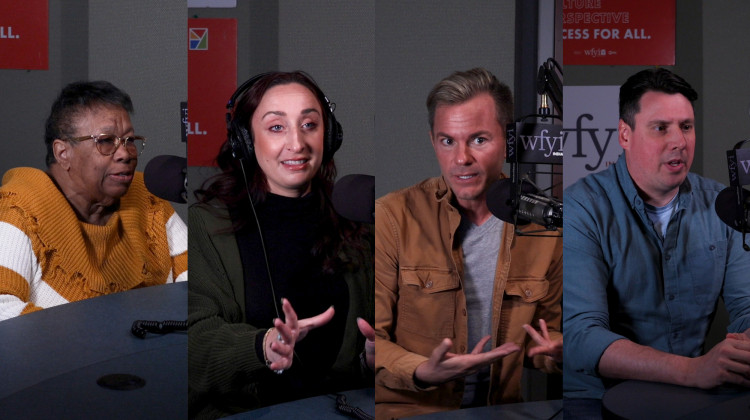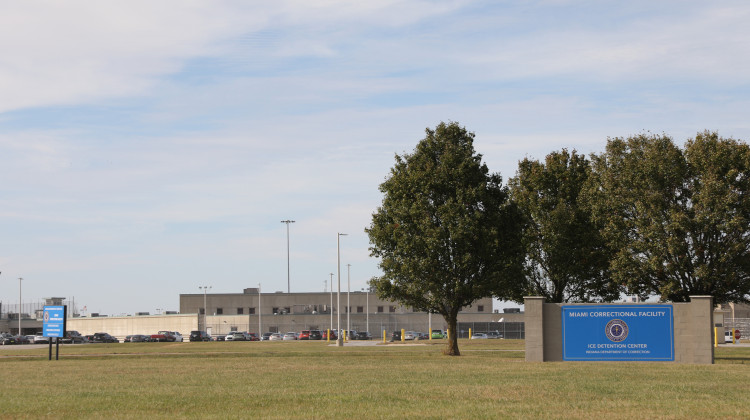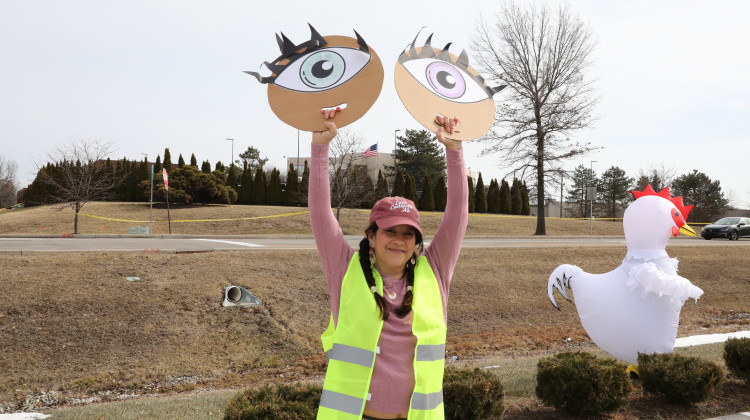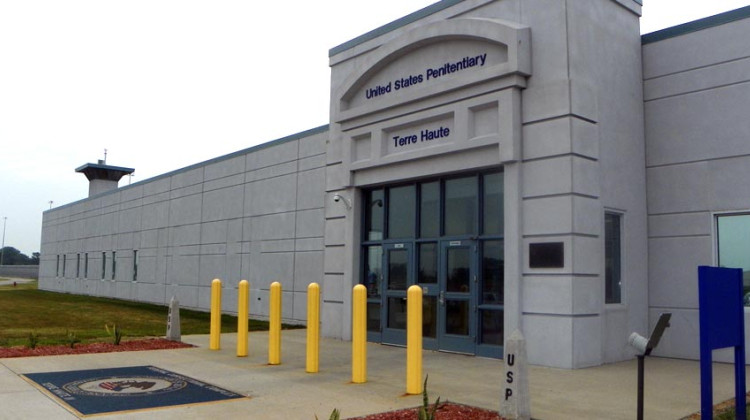
From left to right: Netra McCulley, Lindsey Baker, Morgan Whitacre and Colin Claycomb talked about their experiences as poll workers.
Zach Bundy / WFYIElection Day does not happen without poll workers. People who fill the position help set up equipment, sign in voters and monitor the voting process.
WFYI spoke to poll workers in Marion County ahead of November 5. We asked them about why they chose the role, and what they want people to know about the process.
These interviews have been edited for style and clarity.
Lindsey Baker is 37 and works in administration for higher education. Baker has worked the polls for the past two presidential elections, and she now fills the role of inspector on Election Day.
I decided to work the polls in 2016, there had been a lot of information about the process, and, you know, people were saying that all sorts of outlandish things were happening. I worked as just a regular poll worker. I showed up for the day and helped break down at the end of the day, and it was great.
Then COVID happened, and they had a safety coordinator position, and I was like, 'Okay, well, like, you know, I guess I'll try this now.' I kind of thought that that initial reason would go away, right? Because I'm like, Well, no, like, this is the process. And here are all these people signing legal documents and helping people vote, no matter what they want to vote for who they want to vote for, just glad that they're there.
And there's still this misconception that there's something funny going on at the polls. So I thought, well, I guess I kind of want to be a part of this process to make sure that that's not happening, and to be able to, like, say, with confidence, that's, that's not what's happening here, and here's how this works.
You know, it has been really fun and really rewarding. It's always a really stressful evening before, as the inspector, you have to set up the whole site. So at a school, you know, you're taking out a bunch of tables and setting up maybe 20 different machines. There are things you cannot do that night and things that you have to do that night. And it's usually after work, you know, but then the next day, everybody gets there super early. We've all got food, and you kind of form a team for that day. And it's a really, I find it one of the most rewarding things. That's one of the most rewarding volunteer type things that I do.
I consider this an important job. Yes, absolutely. There's typically a shortage. Actually, every year, we always have a hard time getting enough poll workers. I know, at least in Marion County they're definitely looking for poll workers. Without people doing this job, the process doesn't continue like, when people don't participate, the lines are going to be longer. It's important to be adequately staffed.
You know, like any process, you have to have people to do the job. I always meet interesting people. I work in a neighborhood polling site, and so I typically see the same people each year. I hope that I see a lot of familiar faces, but also a lot of new faces this year. I feel like it's a pretty big election, but just hearing their stories kind of over the years, and also I've worked with several poll workers several years in a row, so I always look forward to two particular ladies that work at my polling site.
Is the election process and the poll process safe and secure? Absolutely. There are lots of ways to register to vote and legal ways to vote. The poll workers are properly trained on voter identification, and the goal that day is to get every eligible voter voted.
Are there any things that I would like voters to know coming to the polls on Election Day? They should come with a smile and ready to cast their ballot. They may speak with some canvassers outside of the polling place, but then once they come in, they have a private, safe, secure way to vote for their candidates of choosing. I guess additionally, I'd like voters to know that they may have some little lines and that the poll workers are going to try to help them as best as they can, and they will get them the resources to to find out how they can vote that day and just be kind to them.
Morgan Whitacre is 39 and works for a local nature nonprofit. Whitacre started working the polls in his 20’s, and talked about why he first decided to be a poll worker.
You know, I've always felt like I needed to do some kind of civic duty. I felt like it's important to be involved. This was instilled in me, kind of at a younger age, you know, I had parents who were civic minded, you know, I went with my parents to the voting booth when I was younger, and so it's something that I always have been very interested in. I went to law school. I've been interested in government for a long time, so I've kind of been drawn to that. I worked in politics for 10 years. This is something that I think that a lot of other young people maybe aren't as interested in.
How has my experience been working the polls in the past? Largely positive. I mean, it's interesting because there are two sets of poll workers. They're partisan, right? So there's part Democratic judges, Republican judges, and then there's the inspector as well. They're also partisan. But it's interesting because everybody gets along really well. It used to be a lot more amicable.
The people in the actual polling facility work together really well. We bring food that we all have together, you know, throughout the day. So that's always really fun. You know, sometimes you can get a little acrimonious with some of the individuals who come to vote, but by and large, I mean, it's usually such a positive experience, that's why I keep doing it.
Do I consider this an important job? Oh, absolutely, definitely. You know, in the past, it's been really difficult for them to find enough poll workers, you know. I mean, so, yes, it's very important, and I encourage all young people especially to to do this. You really get a a different kind of look at at how the process works when you're actually in there doing this on Election Day.
I mean, it is a long job. I mean, it's 6 a.m. to 6 p.m.. It's long and it's a really hard day, but it's a lot of fun, and it's definitely worth it, for sure, meeting all kinds of different people, that's a lot of fun. I mean, thousands of different people coming throughout the polling location throughout the day. And now that we have voting centers, you know, it used to be when we just had precincts, you would have a maximum of like 2,000 people who would come to the polling location.
Now that we have voting centers, literally, there can be tens of thousands of people that come to the polling location throughout the day. So that's always a lot of fun, seeing all different kinds of people, meeting all different kinds of people from different backgrounds. It's a lot of fun. Well, I used to work over at Brookside Community Park on the east side. That's the one that I've worked at for years. This year, I think I'm going to be at Saint Luke United Methodist on the north side. That's big, one of the busiest ones in in the city actually.
Is the election polling process safe and secure? 100% it is safe and secure. Absolutely, that has never been questionable, without a doubt. Never questionable.
Is there anything that I think people should I want people to know or expect at the polls on Election Day? I would say this year, I think long lines. I do think turnout is going to be high this year. I think we've seen kind of signs of that in other states already, but I have a feeling that this year, especially so, you know, I mean, just come with a good attitude, you know, maybe a good book or magazine to read or, you know, be prepared to talk to some people in line and just have fun, you know? I mean, that's what it's kind of all about. Anyway, I think that's part of the process.
It's just been such a positive experience that I just, you know, I encourage anyone who is even remotely interested in this kind of civic duty to do it, yeah, to contact their their county chairperson, to find out how they can get involved with it and to do it. It's just such an important thing to do.
Netra McCulley is 79 years old and has worked the polls for decades. She’s been involved in politics since the 60’s in Indianapolis, when she used to encourage people to vote with a bullhorn from the back of a pickup truck. McCulley says her interest started at a young age.
From high school, I've always been interested in politics. Then I started working at the City-County Building, and I worked at the State Office Building under Edward Goble, and I got involved just listening to people talking and everything. I just got interested in politics.
I've always been interested even in high school, like I said, you know, learning the government and econ stuff like that, it always was interesting to me, you know. And I still I haven't grasped about electoral votes, popular votes. And sometime I have a problem with the electoral votes. I really think sometime that we should be able to win an election off a popular vote, but that's my opinion.
How was my experience working the polls in the past? I enjoyed it. You know, because you get to meet people, you get their opinion. You have some people who come in, they're rude, and you don't have to be rude because they're rude. You just learn how to give a smile if they have a problem, try to answer their problems.
You know, as best you can, if you can't answer it, then you call down to the Election Board. We worked as a team. We worked as a team, and we never really had any problem in our precinct. That's very important. That's what the younger generation doesn't understand. You know, you need to get involved in the political parties. You need to get involved in your country. Because it's not just here, it's all across the United States.
You need to be involved government and econ. Yes, it's good in school, that's a required subject to graduate. We need more younger people to be in involved in the parties. We need to find some way to get some of the younger people involved. Our age is fading out. We're getting where we can... it's hard to get around and stuff like that. So, I mean, we've got to find something to make the kids, the younger generation, more interested in politics.
What do I love about working at the polls? People. I'm a people person. I like talking to the people I see. A lot of older people that I hadn't seen in a while, I retired from General Motors, and when you retire, you get stuck at home a lot, and you don't get out as much when you work the polls, when people come in, it's good to see old people that you grew up and worked with.
Is the election process safe and secure? To me, I try to figure out, how can you say you're cheating? When the clerks check your name and the judge, he runs it through the machine. It ain't like you can run two or three through those machines. You can only run one, one at a time. You can only sign your name once. You can't keep signing, going back in and out, signing your name for other people each year, each time they change and make adjustments to the way you vote. It's more efficient. We're not back in the horse and buggies. We have to learn progress.
Is there anything I want people to know about what to expect at the polls on election day? Only thing I say, be courteous to your poll workers. That's very important, because the poll workers are going to be respectful to you. So you be respectful to them. Sometimes there's a wait. We try to put people at the tables and we try to fix it so your vote be private. It's just all about respect. You have to respect each other.
Colin Claycomb is 40 years old and works in administration at a local school system. He used to work at the clerk’s office before becoming a poll worker this year.
What made me first decide to work the polls is, I guess my background actually was in elections for six years prior to being a poll worker. So ironically, I never worked Election Day at a polling site until last year. So I graduated in 2016 from IUPUI, and was looking for a job, and kind of fell into the election world and finally left it full time, but still feel like it's like a driving part of working with the community directly and what I know.
Elections are a little hectic, long days, long hours. You know, as soon as early voting starts, as an election administrator. You're working pretty much every day until, until that Friday after elections. You're talking 40 days straight and long days, and you're, you know, kind of ready to pull your hair out at the end. But it's worth it longer than I feel. It feels like you're really, you know, giving back to the community.
My first site was down in on the south side of Indy. We had 75 voters, so it made it pretty easy. You know, dealing with thousands a day during early voting and things like that made it a little slower than I'm used to, but it's still good, good experience working directly with the public again. I consider working the polls to be a very important job. Again, you're giving directly back to the community.
Elections are truly ran and administrated by the population. Your local election board is a tiny staff. You know, Marion County has 12 people when we're fully staffed, but you've got 180 voting locations. So to run that, you're talking, you know, thousands of people, including the central count account, tabulating the ballots on Election Day. For all the absentee, you know, all the mail and early voting stuff all has to get counted on Election Day. So it's, it's a big task. You need people there. You need people being engaged and really care about what they're doing.
What I love about working at the polls is you really do get to help some people. There's a lot of people that do need assistance. So it really does feel like you're giving back to the community and that you are taking part in it. Elections are serious, and they do need, they do need people that really want to take part in democracy. I mean, it's how it works. It's not some big, you know, mysterious thing that happens behind a green curtain. Your everyday neighbor is a poll worker. You know, your aunts, uncles, parents, that's generally who you see.
Our election process is safe and secure. You do have people that are kind of giving some pushback, especially in the recent years. I began working elections in 2016 and the atmosphere has changed a bit, but I never felt unsafe, rather than also felt like all the elections were fairly secure. There's a lot of safeguards that go on behind the scenes to make sure that ballots are counted accurately. All the election equipment gets tested, and it's actually done at a public meeting that people can go watch.
You can't just blindly trust things. So having an effective and thorough testing of equipment is very important. So wanting people to know what to expect, to bring a photo ID for the State of Indiana, we do have that law, if they have the time, try to do a bit of research, like there's a statewide referendum that probably many people aren't aware of, and then there's 22 judicial retention questions, which might take some time to go through, and it's just literally a yes-no question.
Definitely do some of your research before getting there. It's going to speed up that process. You're going to cross people who have differing viewpoints. But that's not a bad thing. I mean, it's great that we live in a country that allows for us to have those viewpoints and just respect each other. You know, everyone's there for the same purpose, and that's to cast their vote for the person they feel is gonna do the best job for the position.
Contact WFYI city government and policy reporter Jill Sheridan at jsheridan@wfyi.org.
 DONATE
DONATE






 Support WFYI. We can't do it without you.
Support WFYI. We can't do it without you.